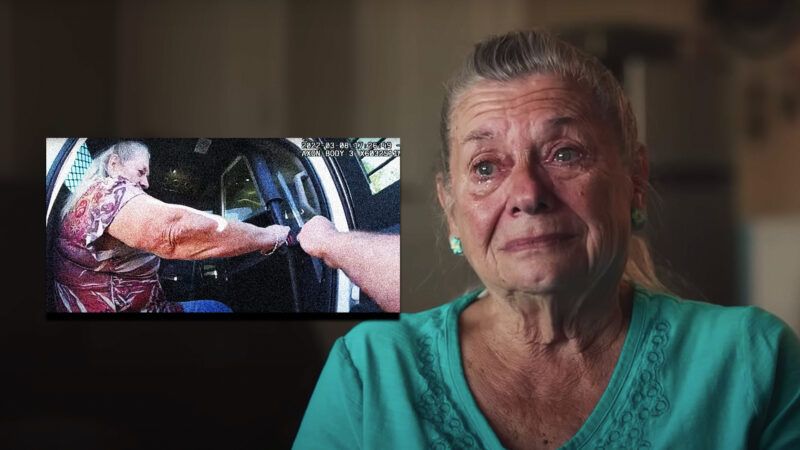This 78-Year-Old Woman Was Arrested for Feeding the Poor
Norma Thornton of Bullhead City, Arizona, is suing for the right to help people in need.

One hundred and twenty days in jail, $1,431 in fines and fees, and up to two years of probation. These are the possible punishments a 78-year-old woman recently stared down for feeding the poor.
On March 8, 2022, police arrested Norma Thornton of Bullhead City, Arizona, for violating a city ordinance that criminalizes sharing food in a public park if that sharing is specifically motivated by charity. A former restauranteur, Thornton has spent her retirement years making hot food and doling it out to people in need. But that mission became significantly harder after the cops caught wind of it and broke up her criminal enterprise at the picnic tables in the park.
"I'm not making a big impact. It's not that much," she says in a recent video filmed about her case. "But at least some people have enough food to survive."
Before taking Thornton into custody, an officer can be heard on his body camera footage saying that the impending arrest was going to be "a PR nightmare." He was not wrong. The local press made Thornton's story a front page one, ultimately prompting the government to drop the charges but with the caveat that it would move to jail her should she have the audacity to reinvigorate the project.
So Thornton is suing, alleging the ordinance violates her right to equal protection, her right to due process, and her privileges and immunities of citizenship. She is not seeking financial damages but rather the right to continue giving out food to those who are hungry.
"It violates her fundamental right to assist people who she encounters in need," says Suranjan Sen, an attorney at the Institute for Justice, who is representing Thornton. "From the very beginning of this country, through the Underground Railroad to the Great Depression and beyond…this country grew and prospered because of people working to help each other out in private acts of charity."
Bullhead City's ordinance does have some exceptions. And it's those very exceptions that may render it unconstitutional. You may share food in the park, so long as it's not with the needy: Passing around food among friends is legal, for example, but it crosses over into unacceptable territory when it is given to those who cannot otherwise afford it. In practice, homeless people have been targeted by the cops for giving food to each other, because the metric by which police enforce the law is by keeping an eye out for folks who appear to be poor. Should a homeless person pass as otherwise, then it's likely he or she would be able to circumvent criminal enforcement.
This makes sense when considering the spirit of the law, which was passed to incentivize the unhoused to go to a shelter as opposed to seeking help from good Samaritans. But such attempts fail to consider the limitations of the state. As the Institute for Justice notes, Bullhead City's largest shelter has a whopping 46 beds, which are often all taken, and which precludes any remaining people from eating breakfast and dinner there; only lunch is available to those not living at the shelter. In effect, the law assumes that the government is capable of addressing this problem without any partnership with the public it claims to serve. (It's also worth noting that "the unhoused in Bullhead City tend to sleep in the desert," not in the park where Norma distributed food, according to the Institute for Justice.)
The government said that Thornton may continue her operation with a permit. Putting aside the absurdity inherent to that—why should someone need a license to help people?—carrying on with her efforts will not be as easy as they make it seem. She must seek that permit 5–60 days in advance, and the terms limit her charity to one two-hour "event" per month. It is also prohibitively expensive. "She spends half of her monthly income buying food for this to share with people," says Sen. "She doesn't have hundreds of dollars to put down every time she wants to share food. She doesn't have the money to get $1,000,000 in liability insurance coverage every time she wants to share food."
Bullhead City is not the first place to try solving homelessness by criminalizing it. A year ago to the day, I covered the case of Joshua Rohrer, a homeless veteran who was arrested and jailed in Gastonia, North Carolina, for panhandling. (His service dog was tased in the process; the animal was later hit by a car and died.) Such attempts at banning begging and charitable giving are plentiful. A Massachusetts' panhandling ban was deemed unconstitutional in 2020 after the state's highest court questioned its lopsidedness: How can it be legal to ask for money if it goes toward a ticket for a show, for example, but illegal if it goes to help someone without means?
That's not unlike the dilemma faced by Thornton, who wouldn't have been arrested that day had she been sharing food with a wealthier bunch. "We're seeking to establish that you cannot target people for criminal treatment specifically because they perform an act with a charitable motivation," says Sen. "This is a form of illegitimate discrimination."


Show Comments (59)